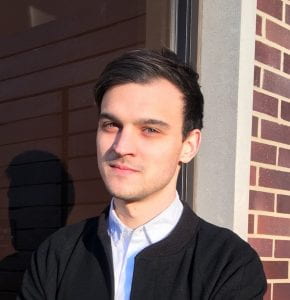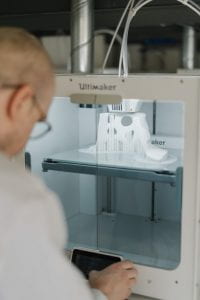 We are delighted to announce that Dr Plamen Dinev has joined our department of Law. Plamen will be leading on Intellectual Property Law, Law and Disruptive Technologies, whilst also making contributions to core elements of our LLB Law programmes, including in the Criminal Law: Theory and Practice module in Year 1.
We are delighted to announce that Dr Plamen Dinev has joined our department of Law. Plamen will be leading on Intellectual Property Law, Law and Disruptive Technologies, whilst also making contributions to core elements of our LLB Law programmes, including in the Criminal Law: Theory and Practice module in Year 1.
We have spoken to Plamen about his research, teaching approach as well as his plans and aspirations in joining Goldsmiths Law.
Where did you work/study before joining Goldsmiths? Are there particular elements of your experience that you’re seeking to bring to Goldsmiths Law?
Prior to joining Goldsmiths, I completed a PhD at City, University of London and an LLM at Leiden University. My PhD involved an interdisciplinary study on the intellectual property (IP) implications of three-dimensional printing, using a combination of legal and empirical methods.
At City, I taught on a number of Law modules and worked as a Research Assistant, collaborating on various research projects involving law and technology, IP commercialization and knowledge transfer for universities.
Goldsmiths University is a world leader in the creative industries and cutting-edge technology—areas where intellectual property plays a major role. I will be eager to bring my expertise in IP and technology to Goldsmiths Law and contribute to its highly distinctive and forward-looking curriculum. Moreover, I will be excited to carry out socio-legal and cross-departmental research, building on the University’s existing strengths and rich heritage in art and technology.
 What is your key area of research expertise?
What is your key area of research expertise?
My research interests lie in the relationship between IP law and technology. IP is a quickly evolving area which has to be flexible enough to respond to the advent of new technologies and rapidly transforming business environments. Nevertheless, it frequently lags behind technological advances and requires regular examination to ensure that it is not only conducive to innovation and growth, but also fairly represents all competing interests. I believe that this is best achieved through evidence-based policymaking, which often involves collecting empirical data and observing the relevant issue within its real-life context. For instance, in 2019, I carried out fieldwork in New York City and interviewed representatives of some of the world’s leading 3D printing companies as part of a Modern Law Review scholarship award. This research allowed me to gain a more nuanced understanding of the relationship between IP law and the technology, thus filling an important gap in the legal literature and making a timely contribution to the debate.
What are the primary intellectual debates in your research area right now?
Intellectual property is one of the most dynamic areas of the law. While copyright and patent law are still largely rooted in the analog world, digital technologies such as 3D printing and artificial intelligence (AI) increasingly raise a range of novel issues which the existing IP framework is not always able to accommodate easily. Could (and should!) copyright subsist in AI-generated output where a machine has generated a creative work with little or no human intervention? Could this have a negative impact on the exceptionality of human creative talent in the long run? Who would be liable for infringement where AI acts with a considerable degree of autonomy? How does copyright law treat 3D scans of classic art and public domain works? Does the existing framework facilitate or hinder the usage of this technology? When answering those questions, lawmakers have the difficult task of balancing competing needs and they must take into account a variety of intricate legal and policy considerations. Above all, it is essential to ensure that IP law incentivises the production of socially valuable intellectual works and inventions while also avoiding excessive monopoly control.
What is your approach to teaching?
It is imperative to place the law within its wider socio-economic context and highlight its practical relevance. Goldsmiths has a rich heritage of social awareness and modules such as Criminal Law allow us to critically examine the law’s direct impact on society; to question whether it adequately fulfils its core aims in light of our constantly evolving social norms and attitudes. The ability to challenge theory and received wisdom enables students to appreciate the finer nuances and prepares them to make a meaningful contribution to society, regardless of whether they choose academia, legal practice or working for an NGO. Moreover, I strongly believe in research-informed teaching as well as relying on innovative and interactive methods such as experiential learning, flipped classroom and mooting—areas where Goldsmiths Law excels.
How can we make a success of virtual teaching, and academic research, in the socially distanced environment in which much of our activity takes place right now?
Virtual learning allows us to rethink certain aspects of our traditional approach to teaching and pushes us to be creative and innovative. There are certainly opportunities to explore—virtual tours, interactive presentations, seminars and guest lectures are all effective learning methods. To nurture a positive learning environment, it is also essential that students have reliable access to personal tutoring and support in the form of regular online office hours.
As for academic research, the current circumstances could actually make conference attendance and knowledge exchange considerably more accessible—both in terms of financial and physical constraints—and thus open to a larger pool of participants. Legal research is not as dependent on access to labs and equipment as other fields, which makes it comparatively easier to continue working and collaborating on research projects without physical access to such facilities.
How do we achieve work-life balance in this fluid world where we are confronted with a constant blurring of the borders between a virtual professional environment and home?
I try to have a space where I just work and I stick to my regular working hours and routine—although it could certainly be challenging. Now that there is little or no commuting, I also try to stay physically active as much as possible. In fact, I completed the most critical stages of my PhD during lockdown and I found exercising indispensable for both mental health and productivity. This is something that I would really like to emphasise as it could make a tangible difference to the wellbeing of both students and academics in those challenging times.
What hobbies are you leaning into?
Besides reading, I enjoy sports and cooking (mostly watching online cooking shows). I’ve done a range of sports throughout my life, including football, skateboarding, table tennis and running, although I mostly just run nowadays. I am also interested in audio (trying out various high-impedance headphones, amplifiers, etc) and I typically listen to music during most of my day. I haven’t been able to get a personal 3D printer yet, although this is something that I look forward to exploring soon.
What are you looking forward to the most being at Goldsmiths?
Goldsmiths offers a unique opportunity to innovate with its highly distinctive programme and rich heritage. I am looking forward to working with its outstanding Law team and collaborating with colleagues from the University’s renowned Departments of Art, Cultural Entrepreneurship and Computing. I am especially excited about its innovative LLB curriculum—which emphasises experiential learning as well as integrating theory and practice—and teaching students who are highly motivated to make a real contribution to society.